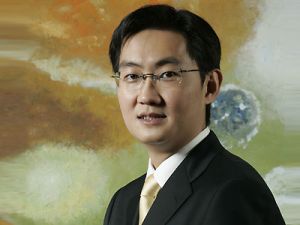Difference between revisions of "Ma Huateng"
imported>Ciic |
imported>Ciic |
||
| Line 1: | Line 1: | ||
| − | [[Image:Ma Huateng.JPEG|thumb|300px]] '''Ma Huateng''' (马化腾) is the founder and chairman of Tencent, China's largest Internet service portal by revenue, the company that created such popular online communication tools as [[QQ]] and [[WeChat]]. | + | [[Image:Ma Huateng.JPEG|thumb|300px]] |
| + | '''Ma Huateng''' (马化腾) is the founder and chairman of Tencent, China's largest Internet service portal by revenue, the company that created such popular online communication tools as [[QQ]] and [[WeChat]]. | ||
Born in rural Shantou, [[Guangdong Province]], on October 29, 1971, Ma moved with his family to Shenzhen in 1984. In 1989, he was admitted to Shenzhen University, where he majored in computer science. After his graduation in 1993, Ma was hired by Runxun Telecommunication Development Co. Ltd., as a software engineer. He was subsequently promoted to development department director. | Born in rural Shantou, [[Guangdong Province]], on October 29, 1971, Ma moved with his family to Shenzhen in 1984. In 1989, he was admitted to Shenzhen University, where he majored in computer science. After his graduation in 1993, Ma was hired by Runxun Telecommunication Development Co. Ltd., as a software engineer. He was subsequently promoted to development department director. | ||
Revision as of 02:59, 21 January 2014
Ma Huateng (马化腾) is the founder and chairman of Tencent, China's largest Internet service portal by revenue, the company that created such popular online communication tools as QQ and WeChat.
Born in rural Shantou, Guangdong Province, on October 29, 1971, Ma moved with his family to Shenzhen in 1984. In 1989, he was admitted to Shenzhen University, where he majored in computer science. After his graduation in 1993, Ma was hired by Runxun Telecommunication Development Co. Ltd., as a software engineer. He was subsequently promoted to development department director.
In 1998, Ma founded Tencent with his friend Zhang Zhidong. When faced with competition from other small IT companies, Ma attempted to sell the company, but negotiations were unsuccessful.
In 1999, at the tail-end of the Internet’s golden era, Ma invested $4 million in foreign risk capital, a 20 percent stake in the company. The capital infusion saved the company from the brink of collapse.
On June 16, 2004, Tencent issued its initial public offering in the Stock Exchange of Hong Kong Ltd. Today, Tencent is one of the country’s largest “app” providers.
However, some industry insiders have expressed their disapproval of Tencent’s methods. Ma Yun, the CEO of Alibaba.com, one of the largest e-business online platforms in China, has criticized one of Tencent’s online portals, paipai.com for its lack of innovations. Wang Zhidong, the former CEO of sina.com, has been even more critical, saying that Ma is best known for his blatant plagiarism. Ma has responded to the complaints of copyright infringement by saying that his process is one of “learning from the best.”
On May 4, 2007, Ma was named one of Time’s 100 most influential people.
Ma received much media attention for a 2011 dispute with online security provider 360.com.
On October 12, 2012, he was listed as the fourth wealthiest person in China, with a net worth of 40.32 billion yuan by Forbes.
Ma was selected as a deputy to the National People’s Congress in 2013.
In July 2013, Ma, whose net worth was estimated at 46.7 billion yuan (US$ 7.61 billion), replaced Liang Wengen, CEO of the SANY Heavy Industry, as China’s wealthiest man, according to Money Week’s list of the “3,000 Most Wealthiest Families in China.”
Ma became the nation's richest man with his net wealth estimated at $13 billion as Tecent's share prices surged to HK$512.5 ($66) on Jan. 16, 2014 from the Hong Kong-listed company 's IPO price of HK$3.7 in 2004.
